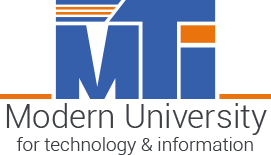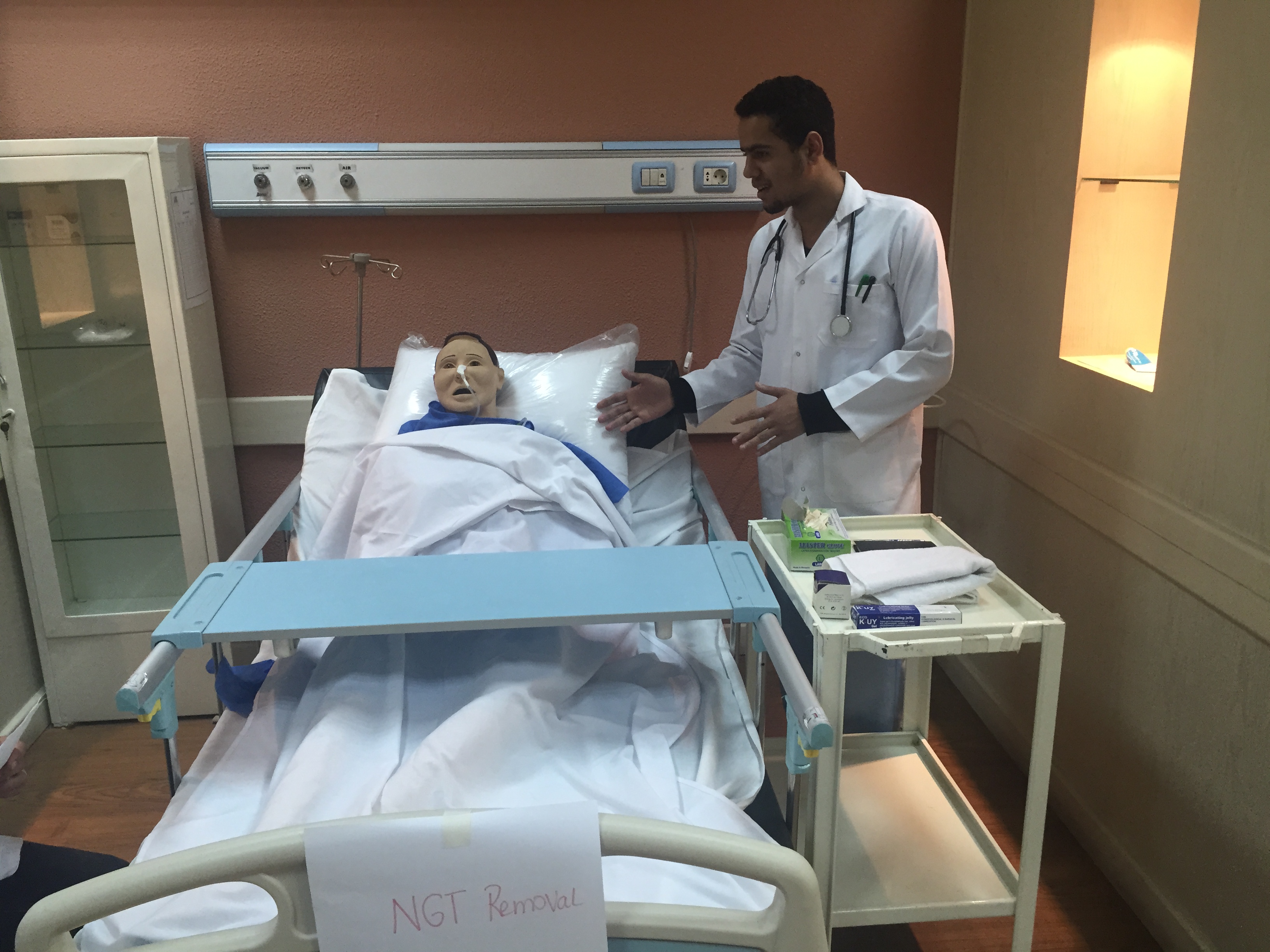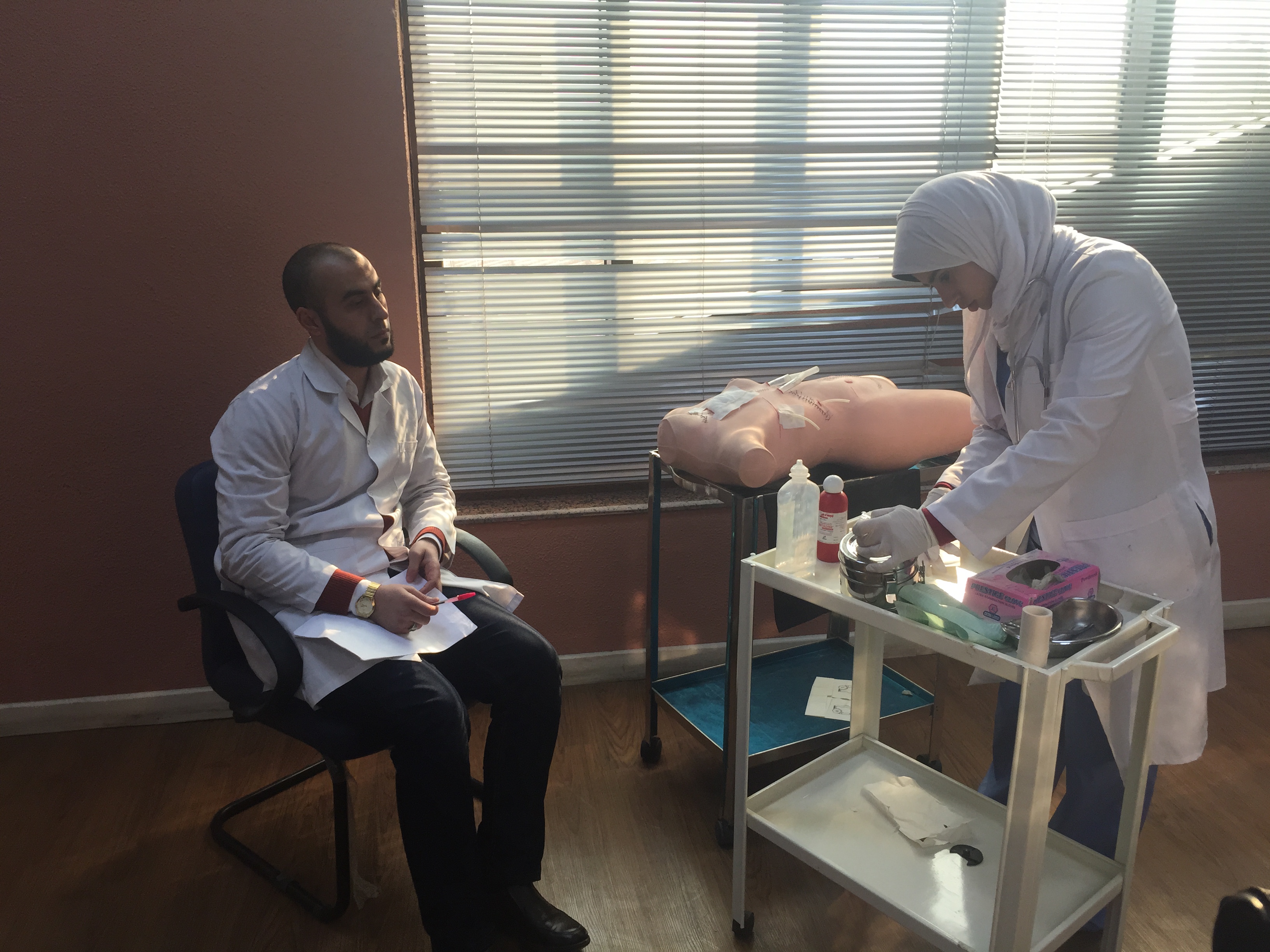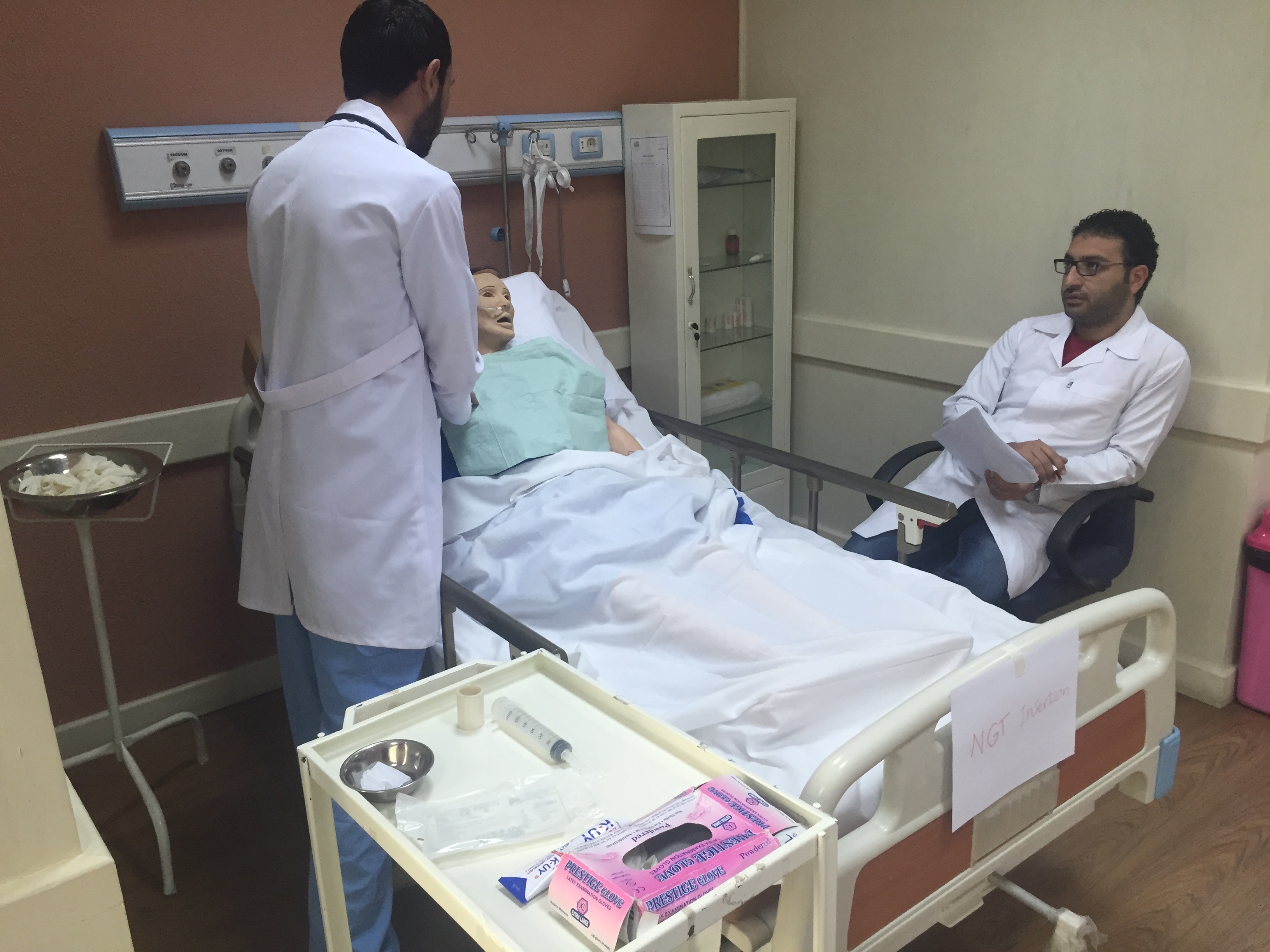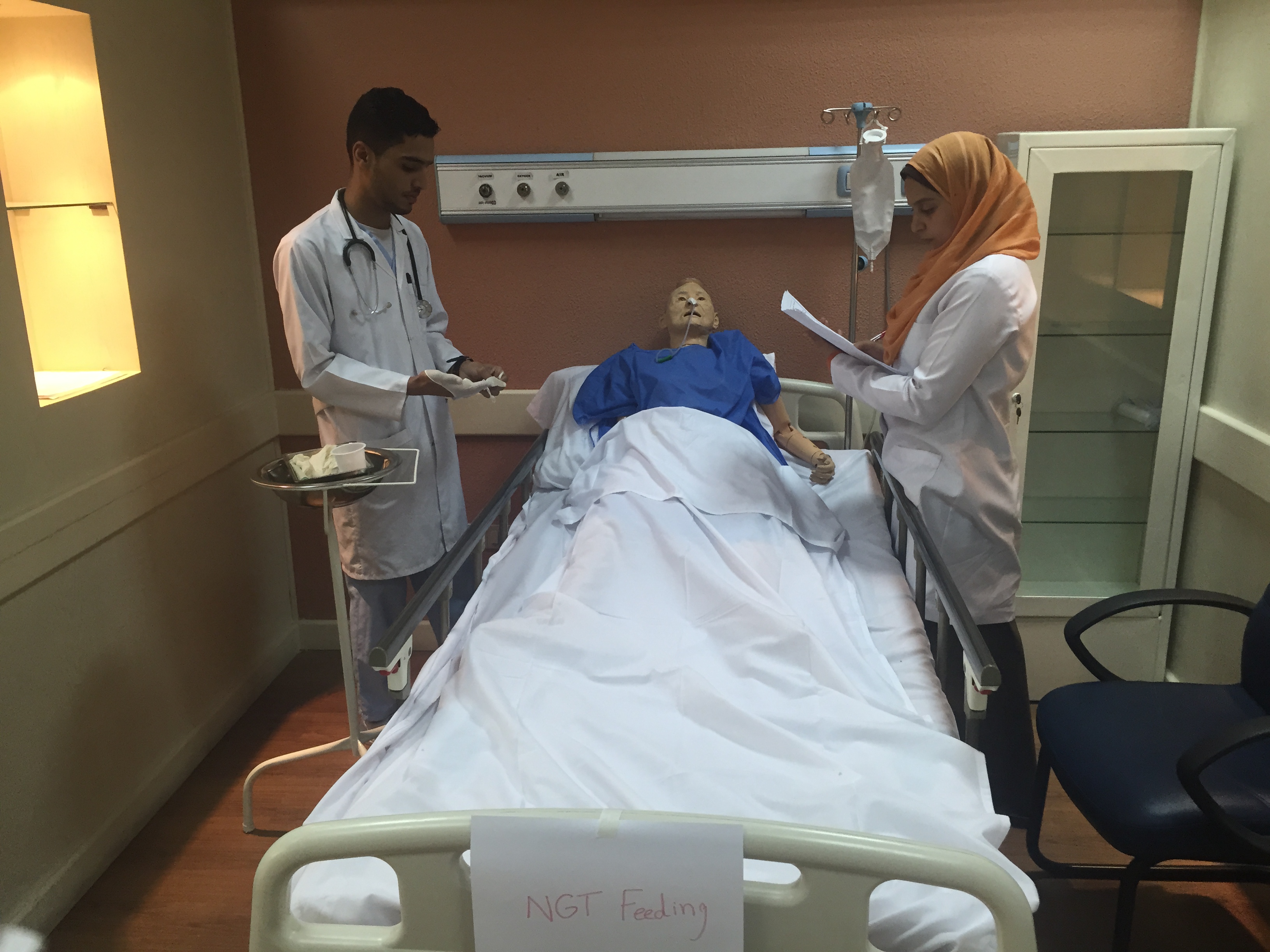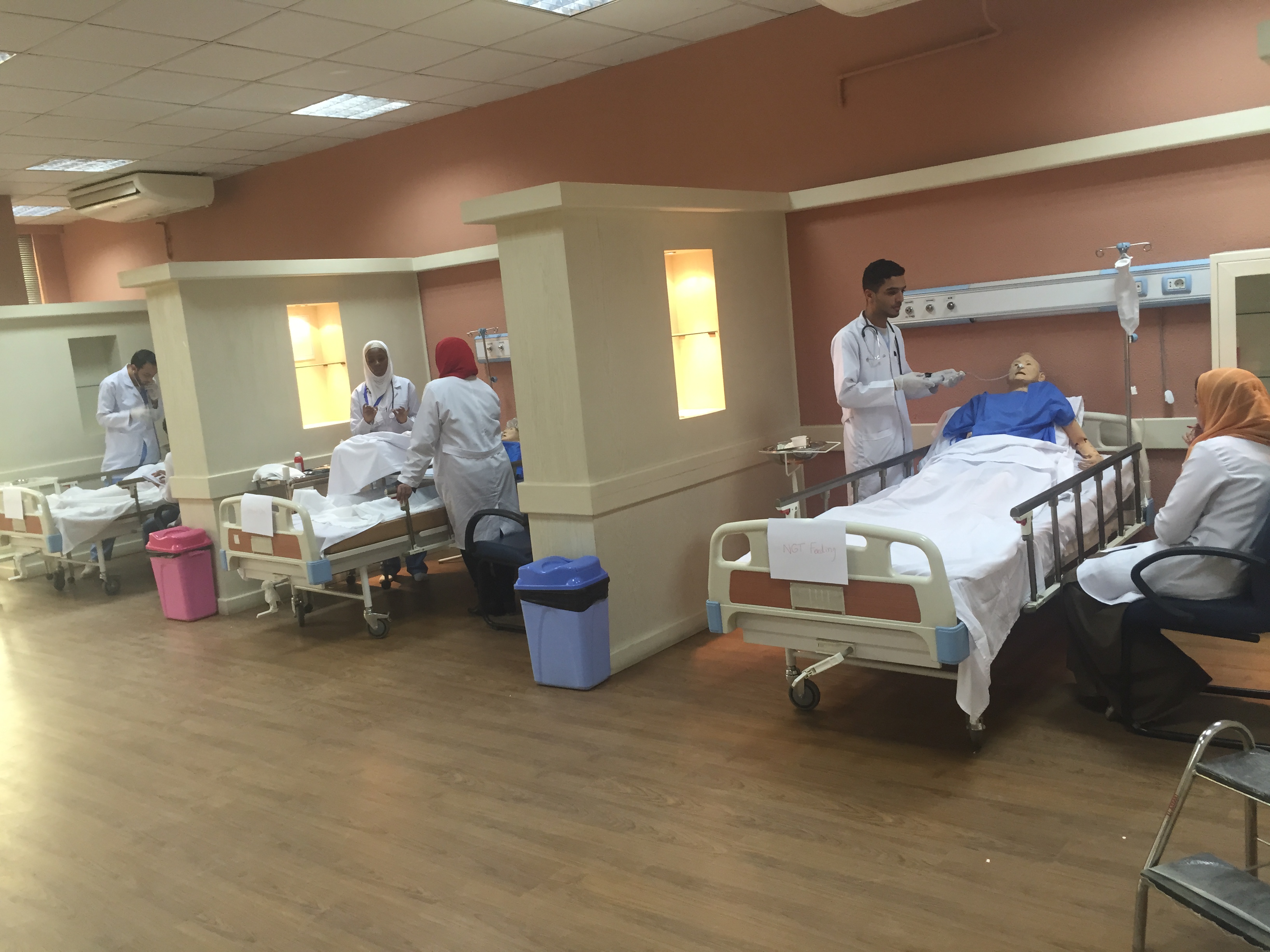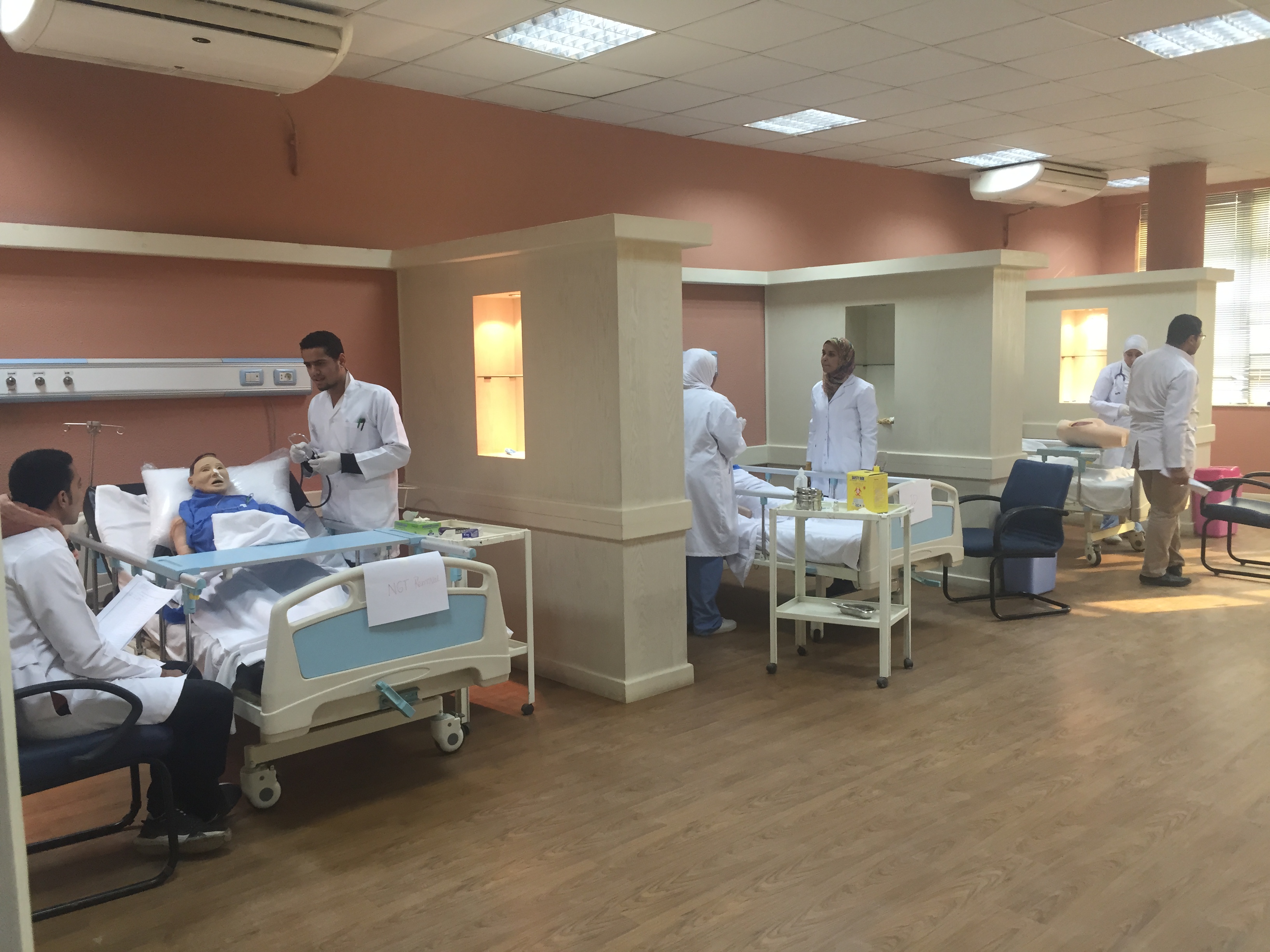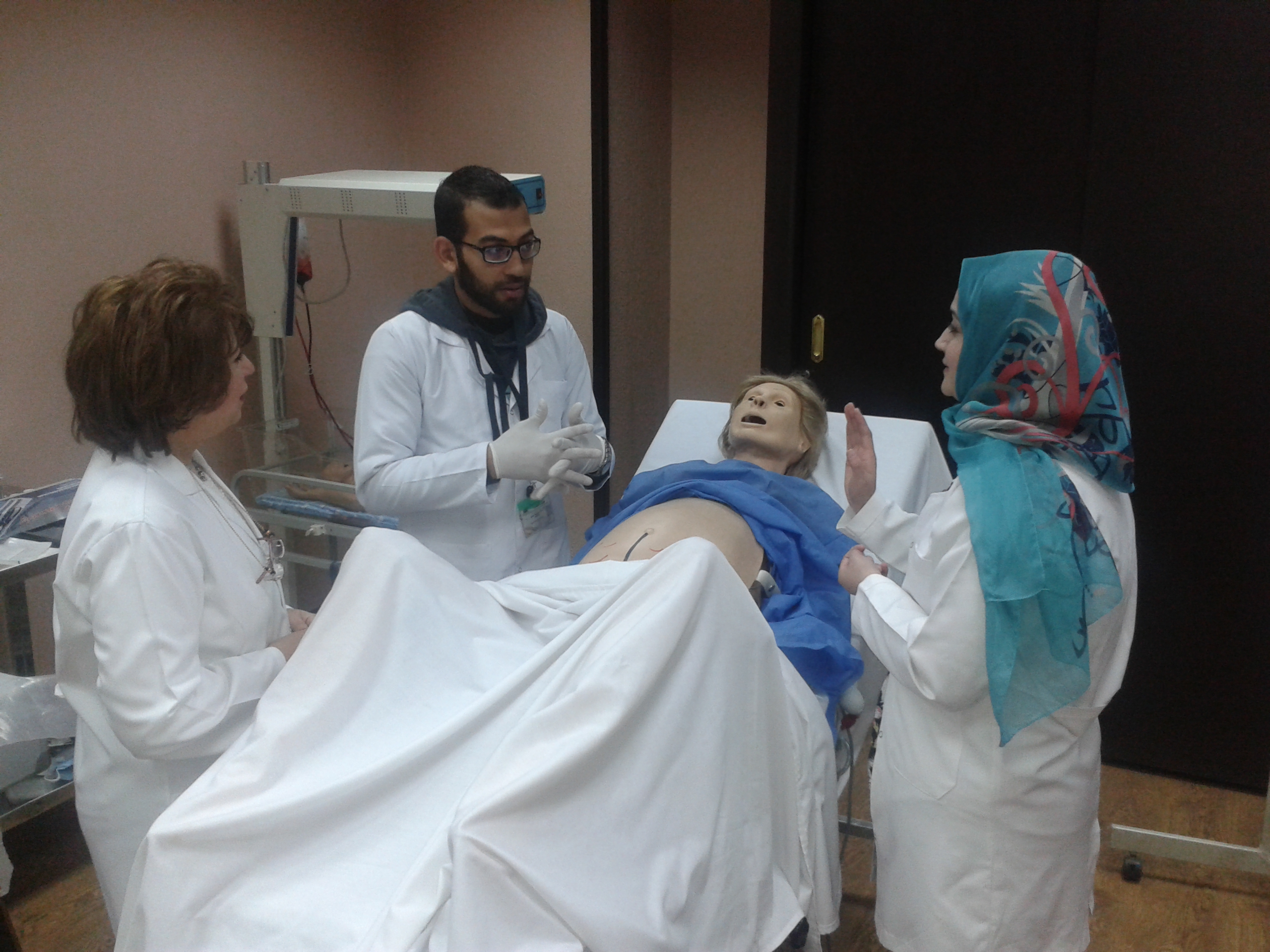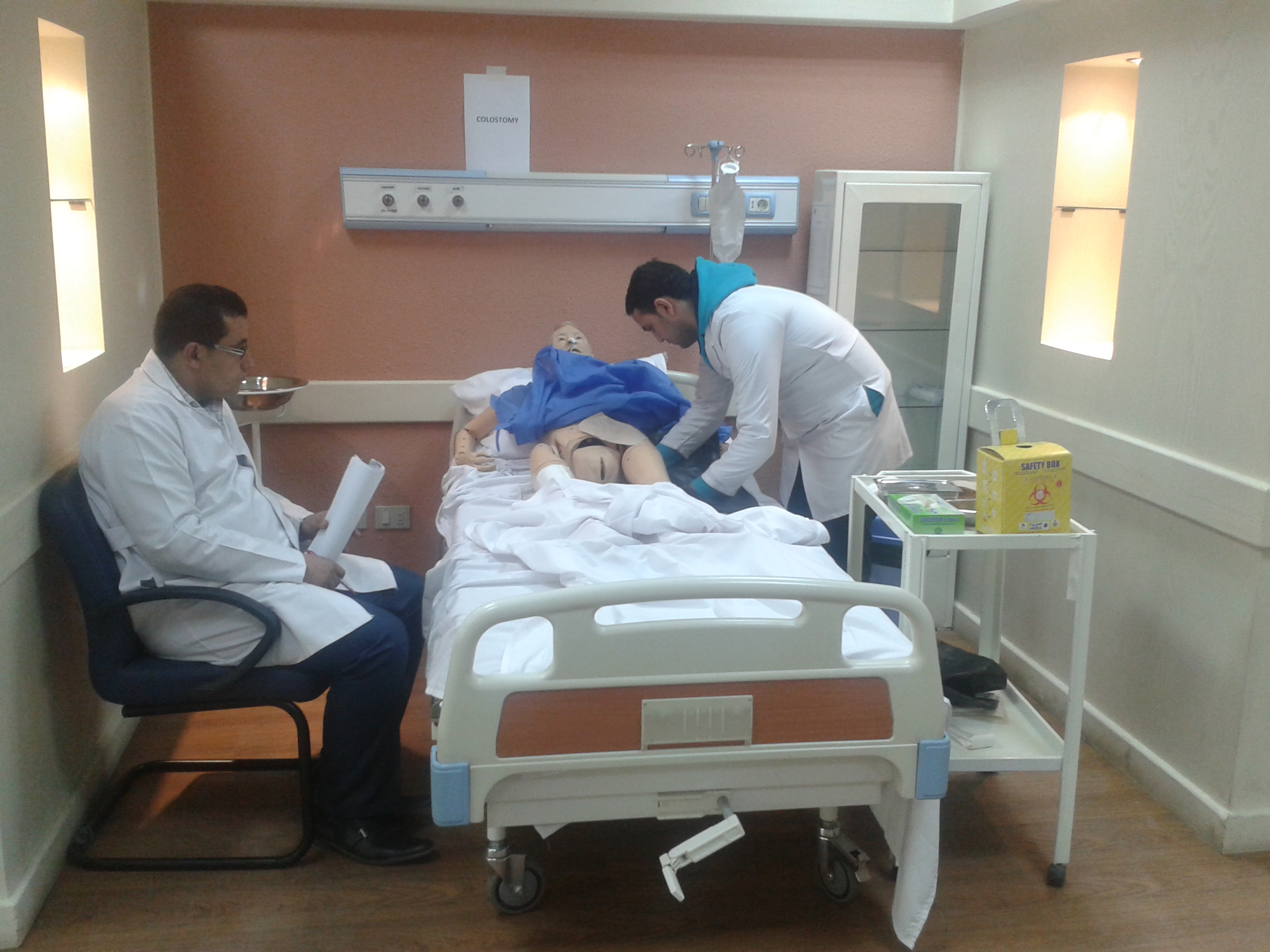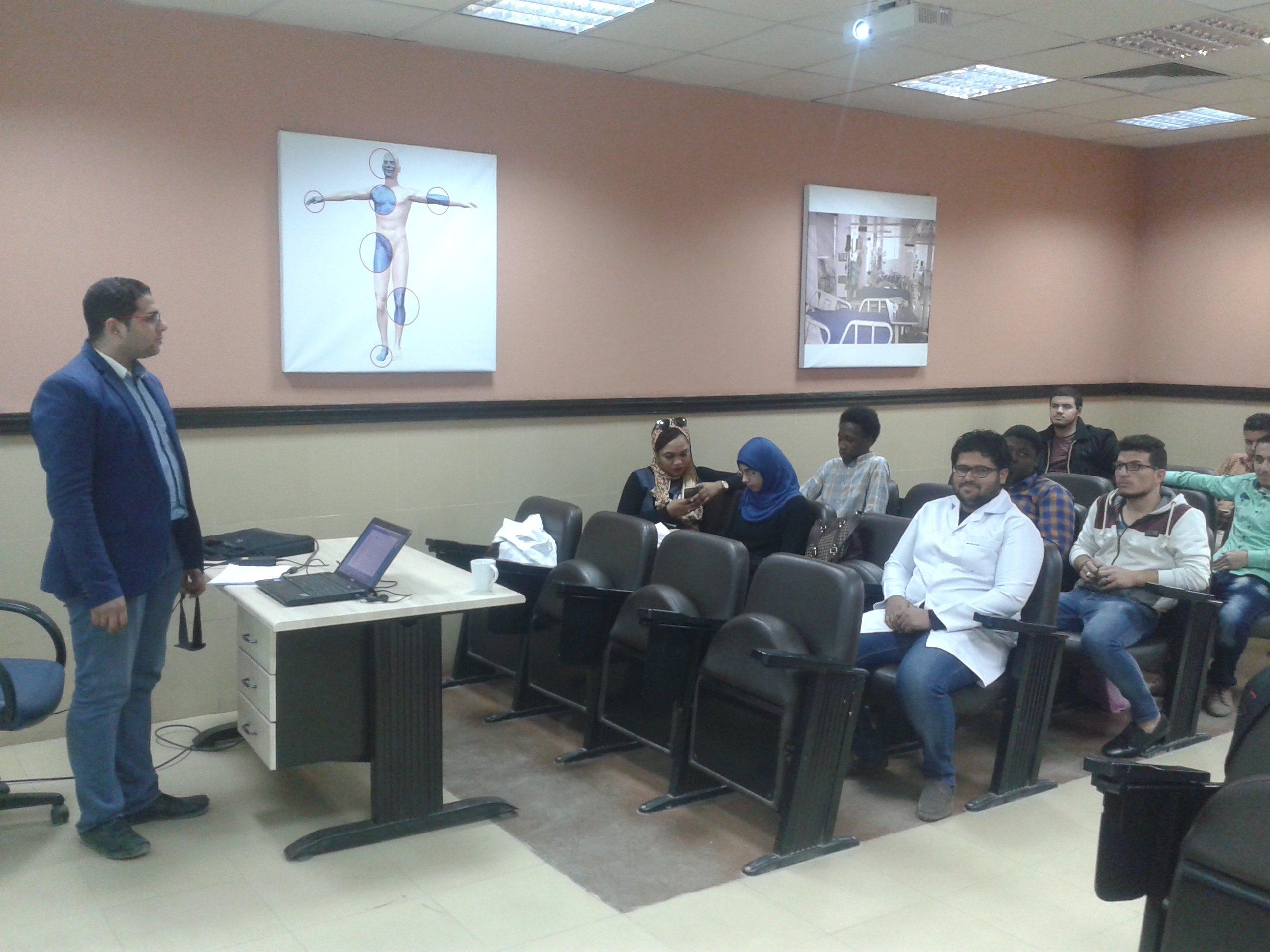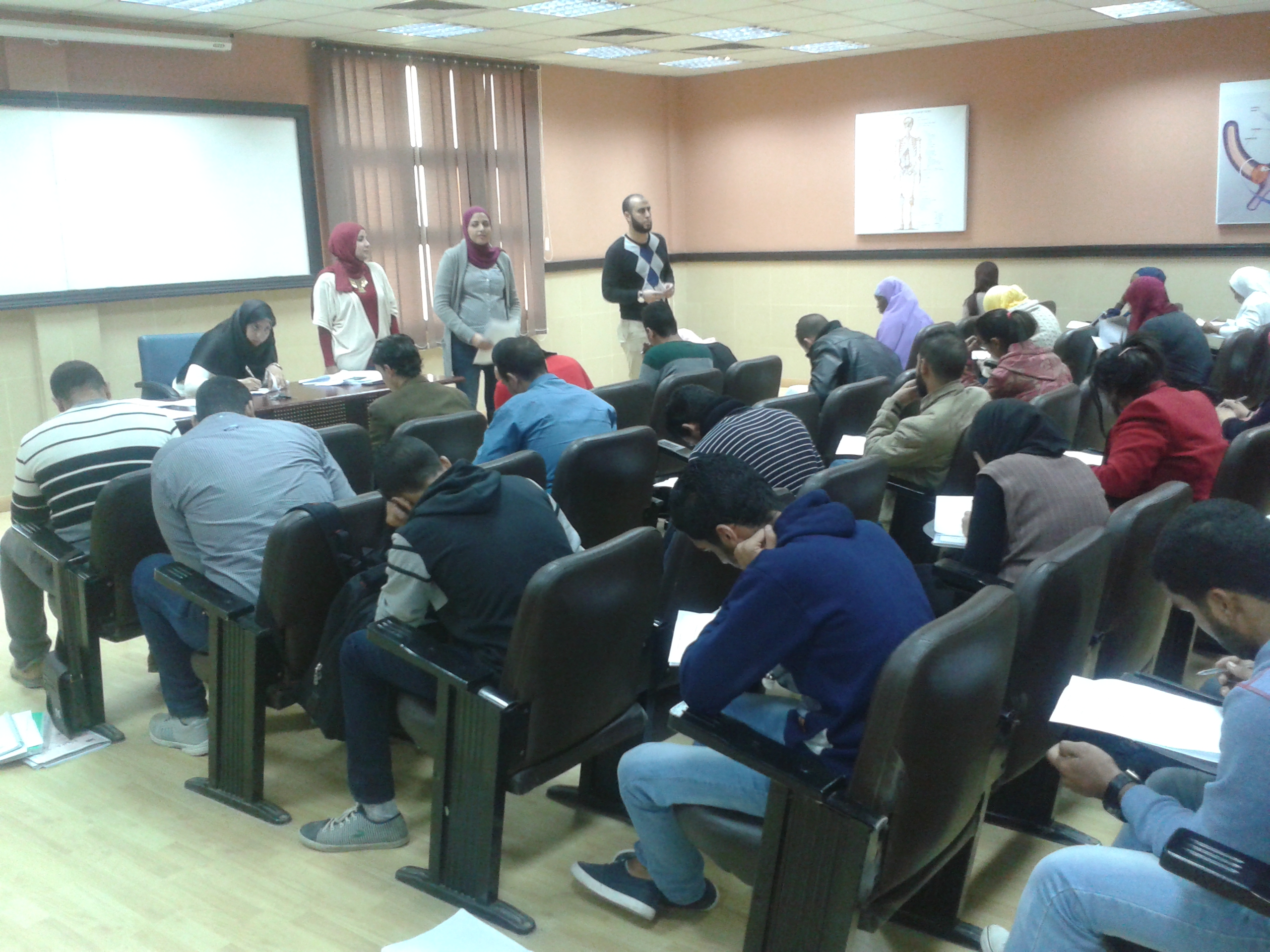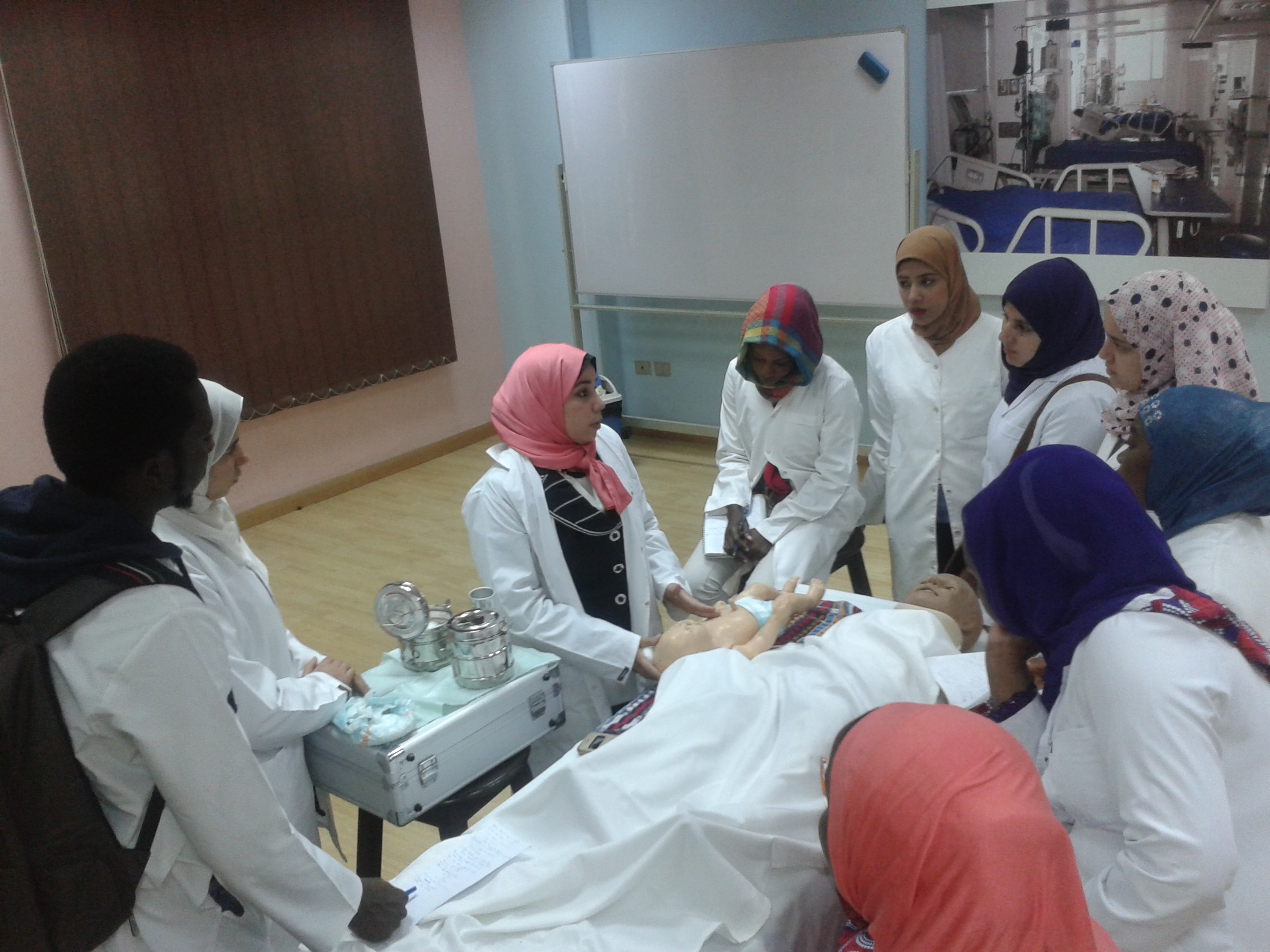Subject title: Human Anatomy I ” Semester I “
| Date | Topics | Credit hrs | Practice | Credit hrs |
| Week 1 | Descriptive anatomical terms, skin & fascia. | 2 | Anatomical position, planes of the body, terms of position. | 1 |
| Week 2 | Bones of Upper Limb | 2 | Clavicle, Scapula Humerus | 1 |
| Week 3 | Bones of Upper Limb | 2 | Radius, Ulna, bones of hand. | 1 |
| Week 4 | QUIZ (I) +Bones of lower Limb | 2 | Hip Bone, Femur & patella. | 1 |
| Week 5 | Bones of lower Limb | 2 | Tibia, Fibula, bones of foot. | 1 |
| Week 6 | Ribs, Sternum and Vertebral Column | 2 | Ribs, Sternum, Vertebral Column | 1 |
| Week 7 | Mandible. | 2 | Mandible. | 1 |
| Week 8 | Mid Term Exam | | | |
| Week 9 | Skull | 2 | Skull in general, Normae, verticalis, frontalis&parietalis. | 1 |
| Week 10 | Skull | 2 | Normaebasalis external & internal. | 1 |
| Week 11 | Muscular system. | 2 | Muscles of head & neck, thorax, abdomen and pelvis. | 1 |
| Week 12 | Muscular system. | 2 | Muscles of upper & lower Limbs | 1 |
| Week 13 | Respiratory system | 2 | Larynx, Trachea & Lungs | 1 |
| Week 14 | QUIZ (II) +Revision | 2 | | 1 |
| Week 15 | Final Term Exam | | | |
Subject title: Human Physiology I ” Semester I “
| Weeks | Topics | Credit hrs |
| 1st & 2ndWeek | Introduction to physiology.- Cell structure.
- Function of components of cell.
- Cell membrane.
- Transport across cell membrane.
| 4 |
| 3rd & 4thWeek | Blood including:- General function.
- Erythropoiesis.
- W.B.Cs: Types and function.
- Platelets.
- Hemostasis.
| 4 |
| 5th & 6thweek | QUIZ (I)The lymphatic system & Body defenses :- Lymphatic system
- Lymphatic vessels
- Lymph nodes
- Lymphatic organs
Body defense :- - Internal defenses (( cells & chemicals))
- Adaptive body defenses
| 4 |
| 7th Week | Midterm | |
| 8th & 9thWeek | Cardiovascular system including:- Cardiac properties.
- Cardiac output.
- Electro cardio gram ” ECG “
- Arterial blood pressure: factors, controlling, regulation
| 4 |
| 10th & 11th Week | Nervous system – Musculoskeletal system including:- Neuromuscular transmission.
- Mechanism of muscle contraction.
- Autonomic nervous system.
| 4 |
| 12th ,13th& 14th Week | QUIZ (II)Respiratory system including ;- Mechanism of Breathing
- Respiratory volumes & capacities
- Respiratory sounds
- External respiration
- Diffusion of gases between the lung and the blood.
- Respiratory center, hypoxia and cyanosis.
| 6 |
| 15th Week | Final Exam | |
Subject title: Pathophysiology I” Semester I “
| Credit hrs | Class Subjects | Date |
| 2 | 1- Introduction to Pathophysiology:A- Structure of cell, how cells reproduce and die. B- What causes of disease? C- How diseases develop? | 1st week |
| 2 | 2- Blood including :a- Structure and functions of different blood components. b- Pathophysiology, symptoms and signs, laboratory tests and treatments for common blood diseases. c- Inflammatory response to infection. | 2nd week |
| 4 | d- Pathophysiology, signs and symptoms of inflammation.e- Pathophysiology of aids. | 3th & 4th week |
| 2 | f- Pathophysiology, diagnosis of infectious diseases in general. | 5th week |
| 2 | 3- Cardiovascular system including :a- Heart failure b- Edema. | 6th week |
| Mid term exam | 7th week |
| 2 | 4- Nervous system – Musculoskeletal system including :c- Structural and functional units of nervous systems. d- Causes , Pathophysiology , diagnosis tests of the following common conditions: | 8th week |
| 2 | 5- Myasthenia graves.6- Causes, Pathophysiology, diagnosis, criteria and treatment of paralytic ileus | 9th week |
| 2 | 7- Gastro Intestinal Tract ( GIT):a- Peptic ulcer. b- Reflux Esoephagitis. c- Vomiting. | 10th week |
| 2 | d- Jaundice.e- Constipation. f- Diarrhea | 11th week |
| 4 | Quiz II8- Respiratory system : a- Pneumothorax. b- Bronchial asthma | 12th & 13thweek |
| 2 | c- Hypoxia.d- Cyanosis. | 14th week |
| Final Exam | 15th week |
| 2 | Introduction to ethics & its importance to nursing education. | 1st week |
| 2 | Ethics in professional nursing practice. | 2nd week |
| 2 | Critical thinking & ethical decision-making. | 3th week |
| 2 | Code of ethics for nurses. | 4th week |
| 2 | Justice: the allocation of health resources.+ Quiz I | 5th week |
| Ethical issues in nursing practice |
| 2 | Reproductive issues & nursing ethics. | 6th week |
| 2 | Infant & child nursing ethics. | 7th week |
| 2 | Midterm exam. | 8th week |
| 2 | Ethical dilemmas of adolescence. | 9th week |
| 2 | Ethical dilemmas of adolescence. | 10th week |
| 2 | Adult health nursing ethics. | 11th week |
| 2 | Psychiatric / mental health nursing issues.+ Quiz II | 12th week |
| 2 | Ethics in the nursing care of elders. | 13th week |
| 2 | Community/ public health nursing ethics. | 14th week |
| 2 | Ethical issues in end of life nursing care. | 15th week |
| Final Exam | 16th Week |
| 30 | Total |
Subject title: Professional Ethic” Semester I “
” Semester II “
Subject title: Human Anatomy II ” Semester II “
| Date | Topics | Credit hrs | Practice | Credit hrs |
| Week 1 | Cardiovascular system | 2 | Demonstration of the (3) circulations (systemic, pulmonary and portal) on simulators | 1 |
| Week 2 | Cardiovascular system. | 2 | Heart. | 1 |
| Week 3 | Cardiovascular system. | 2 | Major Blood Vessels | 1 |
| Week 4 | QUIZ (I) +Nervous System | 2 | Brain. | 1 |
| Week 5 | Nervous System | 2 | Nerves of the body. | 1 |
| Week 6 | Lymphatic system. | 2 | Lymph nodes & Lymph Vessels. | 1 |
| Week 7 | Endocrine system. | 2 | Endocrine glands.. | 1 |
| Week 8 | Mid Term Exam | | | |
| Week 9 | Digestive system and alimentary organs. | 2 | Salivary glands, mouth, pharynx, esophagus, | 1 |
| Week 10 | Digestive system | 2 | Stomach, intestine, liver, pancreas. | 1 |
| Week 11 | Urinary system + female genital system. | 2 | Different parts of urinary and female genital system | 1 |
| Week 12 | Male genital system | 2 | Different parts of urinary and female genital system | 1 |
| Week 13 | Eye + Ear | 2 | Parts of Eye + Ear | 1 |
| Week 14 | QUIZ (II) +Revision | 2 | | 1 |
| Week 15 | Final Term Exam | | | |
Subject title: Human Physiology II ” Semester II “
| Weeks | Topics | Credit hrs |
| 1st & 2ndWeek | The Urinary system including :- Function of the kidney.
- Mechanism of urine formation.
- Ureters, urinary Bladder, and urethra
- Fluid, Electrolyte, and Acid Base Balance
- factors that affect the glomerular filtration rate
| 4 |
| 3rd & 4thWeek | GIT system including:- Function of digestive system
- Gastrointestinal processes and controls
- Activities occurring in the mouth, pharynx, and Esophagus
- Activities of the stomach
- Activities of the small intestine
- Activities of large intestine
| 6 |
| 5th & 6thWeek | QUIZ (I) Immune system | 4 |
| 7th Week | Mid Term Exam |
| 8th , 9th & 10th Week | Endocrine system including :- The chemistry of hormones
- Mechanisms of hormone action
- Control of hormone release
- The major Endocrine organs
– Pituitary gland – Thyroid gland – Parathyriod glands – Adrenal glands – Pancreatic islets – Pineal gland – Thymus gland – Gonads | 6 |
| 11th , 12th& 13thweek | QUIZ (II)The Reproductive system include:- Male reproductive function
- Female reproductive functions & cycles
- Mammary glands
| 6 |
| 14th Week | Revision | 2 |
| 15th week | Final Exam |
Subject title: Pathophysiology II ” Semester II “
| Credit hrs | Class Subjects | Date |
| 2 | 9- Cardiovascular system including:Pathophysiology of : a- Hypertension – Risk factors for cardiovascular diseases. b- Disorders of the Arterial Circulation c- Disorders of the Venous Circulation d- Disorders of Blood Flow Caused by Extravascular Forces | 1st week |
| 2 | e- Risk factors, Pathophysiology, diagnosis of myocardiac infarction. | 2nd week |
| 4 | 10- Nervous system – Musculoskeletal system including :a- Causes , Pathophysiology , diagnostic tests of the following common conditions : – Stroke. – Epilepsy. – Parkinson’s disease. – Ataxia. | 3th & 4th week |
| 2 | 11- Endocrine system including : a- Role of hypothalamus in regulating hormones. b- Alterations in Pituitary, Thyroid, Parathyroid, and Adrenal Function Ú Thyroid Disorders Ú Parathyroid Hormone Disorders Ú Disorders of Adrenal Cortical Function c- Diabetes Mellitus Ú Energy Metabolism Ú Diabetes Mellitus | 5th week |
| 2 | d- Pathophysiology, signs and symptoms, diagnostic tests of endocrine disorder. | 6th week |
| Midterm exam | 7th week |
| 2 | Alterations in Neuromuscular Function- a) The Organization and Control of Motor Function
- b) Skeletal Muscle and Peripheral Nerve Disorders
| 8th week |
| 2 | - c) Basal Ganglia and Cerebellum Disorders
- d) Upper and Lower Motoneuron Disorders
- e) Spinal Cord Injury
| 9th week |
| 2 | - a)
- b) Alterations in Skin Function and Integrity
- a) Structure of the Skin
- b) Manifestations of Skin Disorders
- c) Skin Damage Caused by Ultraviolet Radiation
- d) Primary Disorders of the Skin
| 10th week |
| 2 | Alterations in Urine Elimination- a) Control of Urine Elimination
- b) Alterations in Bladder Function
- c) Cancer of the Bladder
| 11th week |
| 2 | Quiz IIAlterations in Renal Function Ú Congenital and Hereditary Disorders of the Kidney Ú Obstructive Disorders Ú Urinary Tract Infections Ú Disorders of Glomerular Function | 12th week |
| 2 | 12- Respiratory system :e- Pneumothorax. f- Bronchial asthma | 13th week |
| 2 | Revision | 14th week |
| Final Exam | 15th week |
Subject title: Microbiology and Immunology ” Semester II “
| Date | Class subject | CreditHrs |
| 1st week | Introduction to microbiologyPioneers in microbiology- a) Classification of microbial world.
- b) Cell structure: eukaryotic and prokaryotic.
- d) Nature of viruses.
- e) eukaryotic microorganisms
- f) Growth curve
| 2 |
| 2nd week | Control of microbes- a) Physical methods of Sterilization
- b) Chemical methods: disinfectant and antiseptics.
- c) Biochemical methods: antibiotics and chemotherapeutic drugs.
| 2 |
| 3rd week | Medically important M.O. & Infectious diseases of humans. | 2 |
| 4th & 5thweek | Principles of epidemiology.Assessment 1 | 4 |
| 6th week | Nosocomial Infection | 2 |
| 7th week | Mid-term exam |
| 8th week | Nosocomial Infection | 2 |
| 9th week | Infection control | 2 |
| 10th week | Infection control | 2 |
| 11th week | Immune system(a) Factors of infection and virulence: invasiveness and toxigenicity. (b) Body defense mechanisms. - Innate immunity: mechanical, chemical, phagocytosis, and inflammation. ii. Adaptive immunity, the Immunological response: antigens, antibodies,
| 2 |
| 12th & 13th week | Assessment IIImmune system | 2 |
| 14th week | Revision | 2 |
| 15th week | Final exam |
Subject title: Biochemistry ” Semester II ”
| Weeks | Topic | Credit Hours |
| 1st Week | – Physio-Chemical principles | 2 |
| 2nd & 3rd Week | – Carbohydrate chemistry and metabolism. | 2 |
| 4th & 5th Week | – Lipid chemistry and metabolism. | 2 |
| 6th Week | – Insulin, Diabetes Mellitus. | 2 |
| 7th Week | Mid Term Exam |
| 8th Week | – General protein chemistry and metabolism. | 2 |
| 9th Week | – Amino acid chemistry and metabolism. | 2 |
| 10th Week | – Heme metabolism.- Purine and Pyrimidine chemistry and metabolism. | 2 |
| 11th Week | – DNA synthesis (Replication).- RNA synthesis (Transcription). | 2 |
| 12th Week | – Body fluids | 2 |
| 13th Week | – Enzymes. | 2 |
| 14th Week | – Revision | 2 |
| 15th Week | Final Exam |
Subject title: Fundamental of Nursing ” Semester II “
| Credit hrs | Class Subjects | Date |
| 3 | The nature of nursing | 1st week |
| 3 | - Health and wellness
- Human needs
| 2nd week |
| 3 | Assessing health- Physiological mechanisms of TPR & BP
| 3th & 4th week |
| 3 | - Quiz I
- Physical health assessment
| 5th week |
| 3 | Integral components of client care:- Asepsis- Medical & surgical asepsis
| 6th week |
| 7th week |
| 3 | | 8th week |
| 3 | Promoting physiologic health | 9th week |
| 3 | | 10th week |
| 3 | | 11th week |
| 3 | | 12th week |
| 3 | | 13th week |
| 3 | | 14th week |
| 15th week |
Subject title: Clinical Practice-Fundamental of Nursing “Semester II “
| Credit Hours | Lab Procedures | Weeks |
| 5 | -hand hygiene | 1st week |
| 5 | -bed making-heat & cold application | 2nd week |
| 5 | -hygienic care | 3rdweek |
| 5 | -vital signs & bp measurement and recording | 4th week |
| 5 | QUIZ I-physical health assessment | 5th week |
| 5 | -application of principlesof aseptic technique | 6th week |
| Mid Term Exam | 7th week |
| 5 | -medication administration: oral, inhalation, ophthalmic, ear, rectal suppositories. | 8th week |
| 5 | -Intra-dermal, subcutaneous, IM-medication calculation | 9th week |
| 5 | -body mechanics-range of motion exercise | 10thweek |
| 5 | -positioning patient using supportive measures. turning, transferring and lifting | 11thweek |
| 5 | QUIZ II-application of bandage -measurement of height and weight | 12 thweek |
| 5 | -urinary catheter care and condom care, collection of urine and stool specimen-administrating an enema | 13thweek |
| 5 | -administrating oxygen by cannula, face mask, face tent | 14 thweek |
| Final Exam | 15 thweek |


